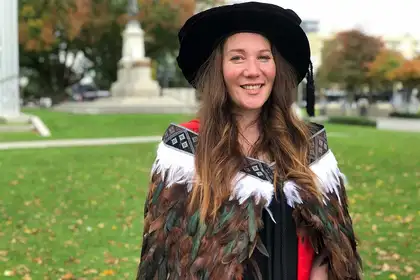
Dr Miriama Ketu-McKenzie at the Manawatū graduation
New doctoral research has shown mindfulness could be a cost-effective tool in improving the health outcomes of Māori women who suffer from chronic stress.
Dr Ketu-McKenzie, Ngāti Raukawa, Ngāti Tuwharetoa, Ngāti Rongomai and Ngāti Whakatere, who graduated on 5 May in Palmerston North, studied a Doctor of Philosophy at the School of Psychology over several years while also training to be a clinical psychologist via Massey’s distance learning programme.
The research showed a Māori centric mindfulness programme run with a group of Māori women was able to help regulate the stress marker hormone cortisol, improve mental health and even led to a waist size reduction in some of the participants.
Dr Ketu-McKenzie’s research aimed at assessing a Mindfulness–Based Stress Reduction course as an intervention for Māori women suffering from chronic stress, which included childhood trauma. “I could see mindfulness had overlaps with te ao Māori concepts and a holistic approach to wellbeing that I thought would fit well with wāhine, but we couldn’t be sure how it would be received.”
The research project took women suffering from chronic stress and a range of serious health problems through an eight-week mindfulness course led by a trained practitioner. “We took a standardised programme but wove in Māori elements such as kai and karakia. Participants told us they recognised karakia was already a form of mindfulness and I think that helped them embrace the training.”
The Dunedin based clinical psychologist says the group format of the mindfulness course along with a holistic understanding of wellbeing and connection to the natural environment and whenua were also a good fit with Māori. She believes her research shows it could be a very useful intervention especially when dealing with chronic stress and complex health problems.
“We were able to show clinically meaningful improvements in the women’s health outcomes and some have carried on with the practice which is great. The results have left me feeling very positive about mindfulness as an alternative intervention to what’s currently on offer.”
Dr Ketu-McKenzie intends to continue working to develop a programme built from the research and is training to be a mindfulness teacher. “When I started this research some seven years ago, mindfulness in Aotearoa was in its infancy but since then it has mushroomed and been commercialised to the point where some call it Mc-Mindfulness. I want to ensure our programme is rooted in the original concepts of holistic wellness and has bi-cultural practises built in."